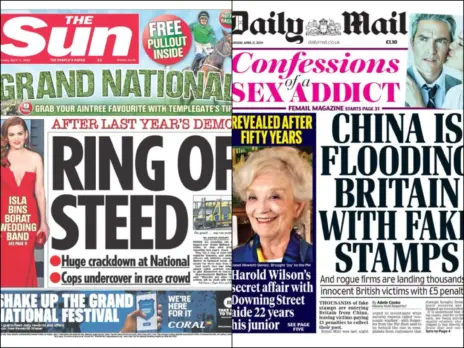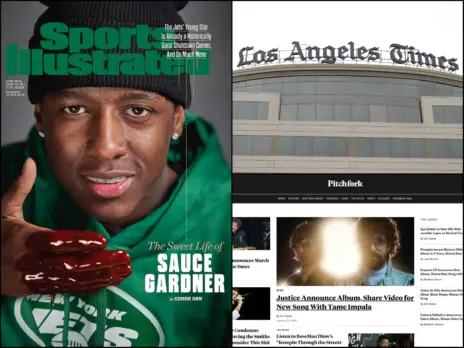
Daily Star Sunday editor Gareth Morgan today welcomed a High Court decision overturning a privacy injunction brought by Environment Secretary Caroline Spelman’s teenage son Jonathan.
However he added that he was disappointed the Spelman family has sought to appeal the decision meaning reporting restrictions remain in place.
Morgan said: ‘This was not a frivolous story, it is in the public interest. This is a great decision for press freedom. It is about whether those with power and money should have more privacy than the average man in the street.”
The gagging order continues until at least 4pm next Friday to give 17-year-old Mr Spelman, who is suing through his mother and father Mark, an opportunity to ask the Court of Appeal for permission to challenge Mr Justice Tugendhat’s ruling.
Mr Spelman was granted the order preventing the publication of sensitive personal information in the Daily Star Sunday by Mr Justice Lindblom at a private hearing earlier this month.
The judge said the information, which was leaked to the newspaper, attracted a reasonable expectation of privacy and publication would not advance the public interest.
But today, Mr Justice Tugendhat concluded that it was “not necessary or proportionate” to continue the injunction.
The court heard that the Spelman family, who were not present, had already incurred legal costs of £60,994.
In his ruling, Mr Justice Tugendhat said that his decision not to continue the injunction until any trial – which would not be before May – was not a “licence” to Express Newspapers or anyone else to publish whatever they chose, or indeed anything at all.
“It is simply a decision not to grant an injunction. If the defendant or anyone else does disclose private information about the claimant, then such disclosure may be the subject of a claim for damages, which may, in an appropriate case, include aggravated damages.
“The question whether or not what has been published is an interference with the claimant’s right to privacy will then fall to be decided on the facts as they are found to be.”
He added that any publisher who did choose to publish something about Mr Spelman would have in mind that it could no longer be assumed that damages at the very low level of early privacy cases such as Naomi Campbell – who received £3,500 in 2002 – were the limit of the court’s powers.
He said: “If a remedy in damages is to be an effective remedy, then the amount that the court may award must not be subject to too severe a limitation.
“Recent settlements in the much publicised phone hacking cases have been reported to be in sums far exceeding what in the past might have been thought to be available to be awarded by the courts.”
Contesting the injunction application, Christina Michalos, counsel for Express Newspapers, had said that the case was about “freedom of expression in its purest sense” and the court should not muzzle the “watchdog function of the press”.
She denied that the real motivation of the story was political and focused on Jonathan Spelman’s mother.
“This is disputed strongly. We say there is an underlying public interest in the story itself.”
Justice Tugendhat said Jonathan Spelman played rugby for England in the under-16 and other squads and for Harlequins, but had not played since being injured in a game last September.
“His youth, and his success in public sport, are two of the most important facts at the heart of this case.”
He said the newspaper had not told the court what information it intended to disclose, but stated in its evidence that its story highlighted “the pressures on elite athletes from the very beginning of their sporting careers” and the facts of Mr Spelman’s story “act as a warning”.
The newspaper said the tip-off came from a member of the public unconnected to the Rugby Football Union, Mr Spelman’s boarding school or Harlequins and it was not a breach of confidence or sourced from his “inside circle”.
Some relevant facts were circulating in rugby circles and were not being treated as confidential, it added.
The judge said that there was little that could be said in a public judgment about the nature of the activity with which the legal action was concerned, except that it was related to Mr Spelman’s sporting achievements and aspirations.
Mr Spelman had made clear that any publicity would be most unwelcome and was greatly feared by him and his parents, and the court accepted that even sympathetic coverage would probably have a serious adverse effect.
The judge said the issue of whether Mr Spelman had a reasonable expectation of privacy was one on which each side had a real prospect of success – as was the issue of public interest.
Public debate about how schools and sporting authorities perform their functions with regard to children was important.
He said: “I must make clear that in the present case no one has put in doubt that the school, or anyone else who may be involved, is doing their best to give appropriate priority to the welfare of the claimant.
“But what is appropriate priority, and what is for the welfare of children and young people, is itself a matter fit for public discussion.
“This can be seen from the history of the last 50 years. Opinions can change.
“Discipline by corporal punishment was almost universal in schools in England, until the 1960s, and it was administered by many parents and school teachers who believed that it was in the best interests of the children. It has since come to be regarded as unacceptable.
“On the other hand, the demands made on children for the benefit of sport have increased very greatly over that period.
“Whereas in the past there was relatively little money to be made out of sport by anyone, sport has in recent years generated huge revenues, mostly from broadcasting and other intellectual property rights.
“So there is a risk that those responsible for organising national and international sporting activities may have interests that conflict with the welfare of the children who participate, or aspire to participate, in these activities.”
Email pged@pressgazette.co.uk to point out mistakes, provide story tips or send in a letter for publication on our "Letters Page" blog







